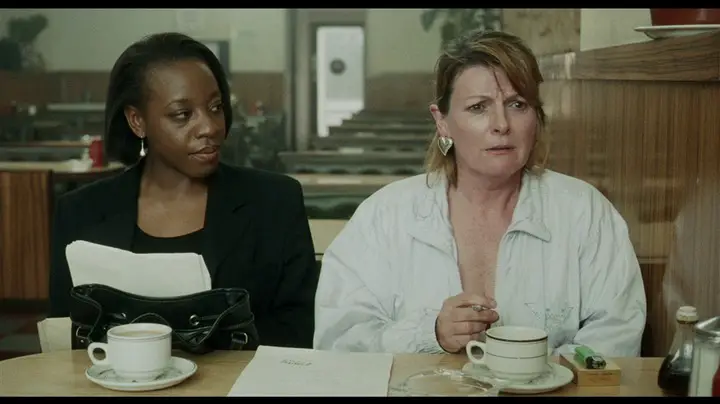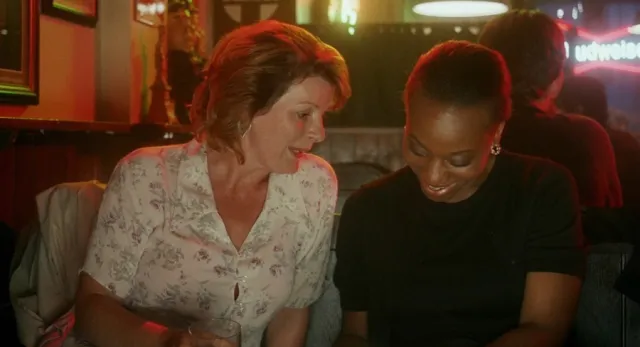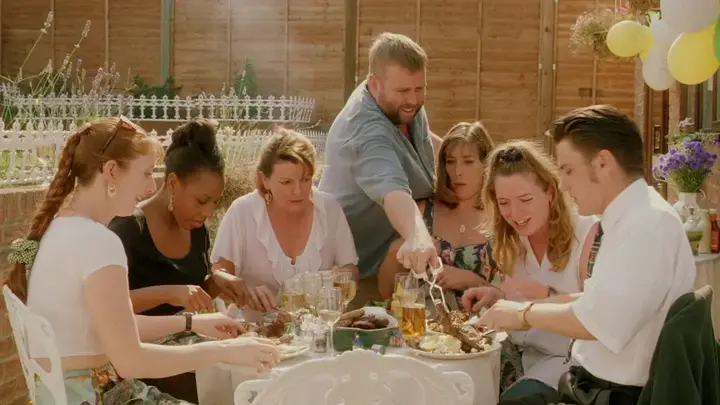Last year, I finally got around to watching some Mike Leigh movies. I was by no means a stranger to the director, as I heard his name bandied about by the likes of Siskel & Ebert and other critics. But it wasn’t until recently that I settled down and watched some of his movies.
Whether it’s his 2004 Vera Drake about a working-class saint named Vera, played by Imelda Staunton, a house cleaner who does abortions on the side to his 1997 minor-work Career Girls featuring Katrin Cartlidge and Lynda Steadman about two women and their decades-spanning friendship, Leigh’s movies are quiet, tender observations about the British working class. (I hesitate to call Career Girls a minor work because, like so much of Leigh’s work, I find myself revisiting moments in my head and letting the emotion wash over me anew.)
Arguably, his most famous work is the 1996 masterpiece Secrets & Lies. At almost two and a half hours, the film never feels its length, and having watched it three times in the last month, I can attest that it has yet to lose its emotional potency. Leigh’s films are often so deeply felt that merely remembering a certain scene or moment is as powerful as watching them for the first time.

Leigh’s films aren’t as concerned with a plot as the characters and story. Secrets & Lies is about Hortense Cumberbatch, played by the luminescent Marianne Jean-Baptiste, who, grieving over her adopted mother’s death, decides to go in search of her birth mother. She discovers her mother is a white woman, Brenda Blethyn’s Cynthia Purely. Modern sensibilities being what they are, one would expect Secrets & Lies to be about race, but Leigh refuses to bend to conventional wisdom.
I say Secrets & Lies doesn’t address the race issue, but perhaps it’s more accurate to say it doesn’t overtly address it. Leigh’s sly decision to give Jean-Baptiste’s character, a Black woman, the most Britsh-sounding name imaginable until Benedict Cumberbatch reared his auburn head is a commentary all its own. In one scene, Leigh cleverly shows that Hortense’s family is no different from Cynthia’s, beset by their own long-running drama between the family dynamics.
For Leigh, movies about one thing are mind-numbing. Secrets & Lies is about a host of things, but at its core, it’s about love. How we lose it, find it, and sometimes crave it too much. Leigh and his long-time cameraman Dick Pope enact an almost Yasujiro Ozu-esque level of observation. Pope’s camera often sits back, framing two characters, letting the drama play out between them. Few directors since John Ford have understood the power of the human face like Leigh. One has only to recall the scene in Vera Drake where the cops come to arrest Vera and how Leigh and Pope sit back and show Staunton’s face, which delivers an opera of emotion in a few seconds.
The same is true in Secrets & Lies, where Leigh and Pope’s all-seeing eyes observe and gingerly hold their characters in their sight. Blethyn’s performance as Cynthia would be over-the-top in a lesser director’s hands. Cynthia is in a constant state of emotional fragility. She’s either crying or on the verge of tears. Yet, it’s the scene where she and Hortense sit in a diner as Hortense tries to get Cynthia to understand there’s no mistake, she’s her daughter, that we realize the power of Leigh’s devastating tender handling of characters.
It is a simple scene: The two sit beside each other, and the camera alternates between wide and medium shots. But as the conversation grows and it finally dawns on Cynthia that Hortense is her daughter, the story is written on their faces. We see Cynthia remember a long-buried memory, which she had hoped never to relive, as she realizes who Hortense’s father is.
Most directors would be happy with merely Hortense and Cynthia. But Leigh has a cast of characters ranging from Cynthia’s little brother Maurice (Timothy Spall), his wife Monica (Phyllis Logan), Cynthia’s daughter Roxanne (Claire Rushbrook), and Maurice’s assistant Jane (Elizbeth Berrington). All of whom are dealing with their troubles and who are every bit as fully realized as Hortense and Cynthia.
That’s what makes Leigh’s films so damn expressive, his characters feel real. Leigh’s cinema is often celebrated for its realism, but that’s misleading. Leigh shrewdly uses theatrical artifice, like in Career Girls, where Leigh cuts back and forth between the past and the present, having the actors playing both their younger and older selves, modulating the archness and twitchy bravado of their performances. What makes his movies feel natural and real is how fully drawn and realized the characters are. Characters that are only on the scene for a moment come off feeling like characters coming in from other movies.
Characters like Lesley Mannville’s social worker, a women who is obviously pressed for time. She has one scene, but it feels so fleshed out that if Leigh chose to do so, she would be a character in an entirely different movie. It goes without saying how great Manville is, but she and Leigh do a wonderful job of depicting a woman who is clearly under stress and aware of the importance of handling Hortense’s question with honesty and compassion. The scene is a microcosm of what separates Leigh from his peers, pulsating with an unpredictable energy. Nonetheless, the scene is also deeply warm and touching. Not only is Manville great, but so is Jean-Baptiste. Her curiosity about her adoption is answered, and she is faced with the question of whether she should pursue it more or leave it.

Secrets & Lies also works as a metatextual comment on how filmmaking as an art form hides and finds the truth. Maurice is a photographer, and we see his clients ranging from families to less-than-happy couples, all posing for Maueice’s lens, hoping the fantasy they put forth will hide the reality they feel. This is perfectly displayed as a beautiful young woman hires Maurice to take pictures of her scars. Her once flawless face now marred with scars from a car accident, the sound of Maurcie’s flash feels like a slap across the face, an invasion of privacy. Even though she asked for it, the realization that the camera reveals more than we’re comfortable with rings with every flash.
Leigh, Pope, and his editor, Jon Gregory, cut together scenes of people sitting for Maurice’s camera. We never see these people again, but Gregory and Leigh cut these scenes so that we get a glimpse into them even after barely getting to know them. Leigh achieves this by working closely with his actors to create the characters. All the while, Maurice, the peacemaker in his family, struggles to get people to smile.
Leigh’s process is possibly more famous than he is. Often, he will come up with an idea or a character, cast an actor or actors, and then work with them on crafting a character and weaving a story from what they create. After Vera Drake was nominated for an Oscar for Best Screenplay, Leigh had to scramble to write a physical script.
Yet, Leigh’s films are tighter and more clear-eyed than most films that adhere strictly to the script. Even the dialogue has a remarkable quality, feeling at once written and natural. For example, Hortense tells her best friend, “There’s nothing rational about grief. Maybe you’re crying for yourself.” Or how Cynthia replies to Maurice when he asks if a leak upstairs is bad, “Yeah. Only when it’s raining.”
Secrets & Lies culminates in a birthday party for Roxanne at Maurice’s. Here, you begin to see how Leigh is a film school all his own. Pope’s camera, once again, sits back as we watch these people eat dinner. It is so effortless, so believable, that if you didn’t know how movies were made, you would have no idea the difficulty of what you are watching must have been. The pauses, the dialogue overlap, the rhythm of the scene, all as Maurice goes back and forth between the table and the grill.
There’s humor, love, and sadness in Leigh’s characters. Oftentimes, battling one another for supremacy. But it’s Leigh himself who holds the most mercy for his characters. There’s never a sense of judgment in Leigh’s films. Rife with empathy, they follow characters like Cynthia, who in any other movie might be ”toxic,” but in Leigh’s hands is a woman in desperate need of love and suffering from the long-armed trauma of her assault.
Leigh’s films succeed because the characters are drawn from the real world. While watching his 1987 short film The Short & Curlies, I was taken aback by how the characters resembled people I knew, like my mother or myself when I was younger. Leigh’s characters come off as “realistic” because trends and IPs don’t infuse them but instead by real flesh and blood people. Real people are messy, sloppy, and hard to like sometimes. In Secrets & Lies, Maurice’s wife Monica suffers from stomach pains; the film hints that it’s more than menstrual cramps. This subplot has no payoff; it is merely a part of their existence, and as someone who is married to someone with chronic pain, it gave Secrets & Lies a feeling of cutting to the bone.

Even the class issues come from a place of complex understanding. Maurice and Monica are middle class, while Cynthia and her daughter live in council housing. Maurice and Monica have three bathrooms, while Cynthia and Roxanne have an outhouse. Growing up, I traveled between the worlds of the working class and the working middle class. Leigh understands the anxieties, jealousies, and a labyrinth of complicated emotions that arise when visiting family that are slightly better off than you. The edge in Cynthia’s voice after Monica shows off her brand new car, “What was wrong with your old one,” is a tone I’ve heard my family members mutter occasionally when visiting relatives.
While Maurice talks to his wife about his parents and how he wished his dad was more expressive, his wife opines, “Can’t miss what you never had.” Maurice replies, “Can’t you?” Secrets & Lies is the kind of film that stays inside your heart rent-free. Though Leigh’s movies often take place in either the past or a present that has become the past, they somehow understand modern life’s inherent loneliness and, in so doing, provide comfort for our weary selves.
Images courtesy of FilmFour Distributors
Have strong thoughts about this piece you need to share? Or maybe there’s something else on your mind you’re wanting to talk about with fellow Fandomentals? Head on over to our Community server to join in the conversation!

